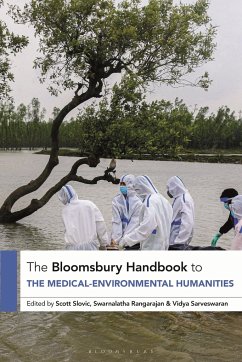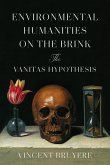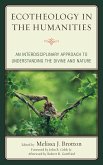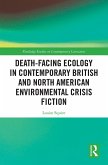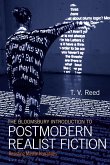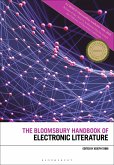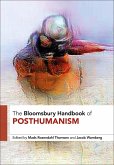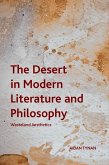The Bloomsbury Handbook to the Medical-Environmental Humanities
Herausgeber: Slovic, Scott; Sarveswaran, Vidya; Rangarajan, Swarnalatha
The Bloomsbury Handbook to the Medical-Environmental Humanities
Herausgeber: Slovic, Scott; Sarveswaran, Vidya; Rangarajan, Swarnalatha
- Broschiertes Buch
- Merkliste
- Auf die Merkliste
- Bewerten Bewerten
- Teilen
- Produkt teilen
- Produkterinnerung
- Produkterinnerung
Bringing together two parallel and occasionally intersecting disciplines - the environmental and medical humanities - this field-defining handbook reveals our ecological predicament to be a simultaneous threat to human health. The book: · Represents the first collection to bring the environmental humanities and medical humanities into conversation in a systematic way · Features contributions from a wide range of interdisciplinary perspectives including literary studies, environmental ethics and philosophy, cultural history and sociology · Adopts a truly global approach, examining contexts…mehr
Andere Kunden interessierten sich auch für
![Environmental Humanities on the Brink Environmental Humanities on the Brink]() Vincent BruyereEnvironmental Humanities on the Brink30,99 €
Vincent BruyereEnvironmental Humanities on the Brink30,99 €![Ecotheology in the Humanities Ecotheology in the Humanities]() Ecotheology in the Humanities67,99 €
Ecotheology in the Humanities67,99 €![Death-Facing Ecology in Contemporary British and North American Environmental Crisis Fiction Death-Facing Ecology in Contemporary British and North American Environmental Crisis Fiction]() Louise SquireDeath-Facing Ecology in Contemporary British and North American Environmental Crisis Fiction61,99 €
Louise SquireDeath-Facing Ecology in Contemporary British and North American Environmental Crisis Fiction61,99 €![The Bloomsbury Introduction to Postmodern Realist Fiction The Bloomsbury Introduction to Postmodern Realist Fiction]() T V ReedThe Bloomsbury Introduction to Postmodern Realist Fiction35,99 €
T V ReedThe Bloomsbury Introduction to Postmodern Realist Fiction35,99 €![The Bloomsbury Handbook of Electronic Literature The Bloomsbury Handbook of Electronic Literature]() The Bloomsbury Handbook of Electronic Literature55,99 €
The Bloomsbury Handbook of Electronic Literature55,99 €![The Bloomsbury Handbook of Posthumanism The Bloomsbury Handbook of Posthumanism]() The Bloomsbury Handbook of Posthumanism47,99 €
The Bloomsbury Handbook of Posthumanism47,99 €![The Desert in Modern Literature and Philosophy The Desert in Modern Literature and Philosophy]() Aidan TynanThe Desert in Modern Literature and Philosophy32,99 €
Aidan TynanThe Desert in Modern Literature and Philosophy32,99 €-
-
-
Bringing together two parallel and occasionally intersecting disciplines - the environmental and medical humanities - this field-defining handbook reveals our ecological predicament to be a simultaneous threat to human health. The book: · Represents the first collection to bring the environmental humanities and medical humanities into conversation in a systematic way · Features contributions from a wide range of interdisciplinary perspectives including literary studies, environmental ethics and philosophy, cultural history and sociology · Adopts a truly global approach, examining contexts including, but not limited to, North America, the UK, Africa, Latin America, South Asia, Turkey and East Asia · Touches on issues and approaches such as narrative medicine, ecoprecarity, toxicity, mental health, and contaminated environments. Showcasing and surveying a rich spectrum of issues and methodologies, this book looks not only at where research currently is at the intersection of these two important fields, but also at where it is going.
Produktdetails
- Produktdetails
- Verlag: Bloomsbury Academic
- Seitenzahl: 426
- Erscheinungstermin: 22. August 2024
- Englisch
- Abmessung: 246mm x 189mm x 25mm
- Gewicht: 454g
- ISBN-13: 9781350304543
- ISBN-10: 1350304549
- Artikelnr.: 68911437
- Verlag: Bloomsbury Academic
- Seitenzahl: 426
- Erscheinungstermin: 22. August 2024
- Englisch
- Abmessung: 246mm x 189mm x 25mm
- Gewicht: 454g
- ISBN-13: 9781350304543
- ISBN-10: 1350304549
- Artikelnr.: 68911437
Scott Slovic is University Distinguished Professor of Environmental Humanities and has been teaching at the University of Idaho, USA, since 2012-previously he was a professor at Texas State University and the University of Nevada, Reno. He served as founding president of the Association for the Study of Literature and Environment (ASLE) from 1992 to 1995, and since 1995 he has edited ISLE: Interdisciplinary Studies in Literature and Environment for ASLE and Oxford University Press. He is the author, editor, or co-editor of twenty-seven books, including, most recently, The Routledge Handbook of Ecocriticism and Environmental Communication (with Swarnalatha Rangarajan and Vidya Sarveswaran). His forthcoming books include Nature in Literary Studies (coedited with Peter Remien) for Cambridge University Press's Critical Concepts Series. He coedits Routledge Studies in World Literatures and the Environment with Swarnalatha Rangarajan and Routledge Environmental Humanities with Joni Adamson and Yuki Masami. Swarnalatha Rangarajan is Associate Professor of English and has been teaching at the Indian Institute of Technology Madras since 2010. Previously, she was a Fulbright Pre-Doctoral Fellow at Harvard University and a Charles Wallace Fellow at Cambridge University. She has coedited such books as Ecoambiguity, Community, and Development: Toward a Politicized Ecocriticism (2014) and Ecocriticism of the Global South (2015) (with Scott Slovic and Vidya Sarveswaran) and is the author of the novel Final Instructions (2015). She served as the founding editor of The Indian Journal of Ecocriticism and has guest-edited two special issues on Indian ecosophy for The Trumpeter. Her monograph Ecocriticism: Big Ideas and Practical Solutions appeared in 2018. Vidya Sarveswaran is Professor of English and has been teaching at the Indian Institute of Technology Jodhpur since 2012. Before that she taught for thirteen years at Ethiraj College for Women in Chennai. She was a Fulbright Scholar at the University of Nevada, Reno, in 2008-09, and in 2016 she was a Rachel Carson Fellow at the University of Munich. As mentioned above, she coedited Ecoambiguity, Community, and Development, Ecocriticism of the Global South, and The Routledge Handbook of Ecocriticism and Environmental Communication with Scott Slovic and Swarnalatha Rangarajan. She is also a documentary filmmaker and has recently been completing a film that documents ecological narratives in Rajasthan.
1. Acknowledgments 2. Scott Slovic
Swarnalatha Rangarajan
and Vidya Sarveswaran
Introduction Part 1. Conceptualizing Convergence: Econarratology and Narrative Medicine
Graphic Medicine and Environmental Texts
Virology
Grey Ecology
and Ecopsychology 3. Eric Morel
Narrative Knowing and Narrative Practice 4. Mita Banerjee
Black Lives Matter in Flint
Michigan 5. Sathyaraj Venkatesan and Chinmay Murali
Graphic Medicine
Ecological Consciousness 6. Maria Whiteman
Fungi Umwelt 7. Z. Gizem Yilmaz Karahan
Contagious History 8. Lars Schmeink
The Grey Ecology of Zombie Fiction 9. Tathagata Som
Climate Change and Grief 10. Samantha Walton
Eco-Recovery Memoir and the Medical Environmental Humanities Part 2. Environmental Toxicity and Public Health 11. Sofia Varino
Pathogenic (Auto)Ecologies 12. Robin Chen-hsing Tsai
Toward an Ethics of Transcorporeality and Public Health in Taiwanese Ecopathodocumentary 13. Heather Leigh Ramos
Resisting Slow Violence
Environmental Toxins
and Systemic Racism 14. Kathryn Yalan Chang
'Reframing Care' in the Age of a Novel Corona Virus 15. Nikoleta Zampaki
Poetry and Art in the Age of Anthropocene Part 3. Varieties of Entanglement: Landscapes
Bodyscapes
Micro- and Macro-biota 16. Susanne Lettow
Health
Disease
and the Body in Ecofeminist Theory 17. Jorge Marcone
A Gut Feeling 18. Henry Obi Ajumeze
Performing Damaged Land/Body-scape in the Niger Delta 19. Chia-ju Chang
Pathological Mimesis and Buddhist Phármakon in the Anthropocene Pandemic 20. Françoise Besson
Fighting the Spread of Disease through Words 21. Animesh Roy
From the Clinical to the Ecocultural Part 4. Exemplifying Specific Cultural Approaches to the Convergences of Environment
Health
and the Arts 22. Raghul V. Rajan
Ayurvedic Vision on Health and Environment 23. Animesh Mohapatra and Jyotirmaya Tripathy
Health and Hygiene Discourses in the Early Twentieth Century 24. Marcos Colón
(Un)sustainable Ecology 25. Chinonye Ekwueme-Ugwu
Nature and Traditional Medicine in Chinua Achebe's Arrow of God and Things Fall Apart 26. Kiu-wai Chu
The Tales of Chinese Herbs 27. John Charles Ryan
'Into the Sap Stream' 28. Fazila Derya Agis
Turkish Classical Songs' Lyrics and Related Idioms for a Literary Therapy for Curing Ecodepression 29. Tess Maginess
Expressing Concepts of Environment through Concepts of Madness in Some Irish Literature 30. Epilogue: Our Bodies
Our Minds
Our Planet Scott Slovic
You Don't Know What You Got 'Til It's Gone Swarnalatha Rangarajan
The Gasping Turtle and Other Hypoxia Narratives: Prana in a Threatened World Vidya Sarveswaran
Dying to Breathe
Swarnalatha Rangarajan
and Vidya Sarveswaran
Introduction Part 1. Conceptualizing Convergence: Econarratology and Narrative Medicine
Graphic Medicine and Environmental Texts
Virology
Grey Ecology
and Ecopsychology 3. Eric Morel
Narrative Knowing and Narrative Practice 4. Mita Banerjee
Black Lives Matter in Flint
Michigan 5. Sathyaraj Venkatesan and Chinmay Murali
Graphic Medicine
Ecological Consciousness 6. Maria Whiteman
Fungi Umwelt 7. Z. Gizem Yilmaz Karahan
Contagious History 8. Lars Schmeink
The Grey Ecology of Zombie Fiction 9. Tathagata Som
Climate Change and Grief 10. Samantha Walton
Eco-Recovery Memoir and the Medical Environmental Humanities Part 2. Environmental Toxicity and Public Health 11. Sofia Varino
Pathogenic (Auto)Ecologies 12. Robin Chen-hsing Tsai
Toward an Ethics of Transcorporeality and Public Health in Taiwanese Ecopathodocumentary 13. Heather Leigh Ramos
Resisting Slow Violence
Environmental Toxins
and Systemic Racism 14. Kathryn Yalan Chang
'Reframing Care' in the Age of a Novel Corona Virus 15. Nikoleta Zampaki
Poetry and Art in the Age of Anthropocene Part 3. Varieties of Entanglement: Landscapes
Bodyscapes
Micro- and Macro-biota 16. Susanne Lettow
Health
Disease
and the Body in Ecofeminist Theory 17. Jorge Marcone
A Gut Feeling 18. Henry Obi Ajumeze
Performing Damaged Land/Body-scape in the Niger Delta 19. Chia-ju Chang
Pathological Mimesis and Buddhist Phármakon in the Anthropocene Pandemic 20. Françoise Besson
Fighting the Spread of Disease through Words 21. Animesh Roy
From the Clinical to the Ecocultural Part 4. Exemplifying Specific Cultural Approaches to the Convergences of Environment
Health
and the Arts 22. Raghul V. Rajan
Ayurvedic Vision on Health and Environment 23. Animesh Mohapatra and Jyotirmaya Tripathy
Health and Hygiene Discourses in the Early Twentieth Century 24. Marcos Colón
(Un)sustainable Ecology 25. Chinonye Ekwueme-Ugwu
Nature and Traditional Medicine in Chinua Achebe's Arrow of God and Things Fall Apart 26. Kiu-wai Chu
The Tales of Chinese Herbs 27. John Charles Ryan
'Into the Sap Stream' 28. Fazila Derya Agis
Turkish Classical Songs' Lyrics and Related Idioms for a Literary Therapy for Curing Ecodepression 29. Tess Maginess
Expressing Concepts of Environment through Concepts of Madness in Some Irish Literature 30. Epilogue: Our Bodies
Our Minds
Our Planet Scott Slovic
You Don't Know What You Got 'Til It's Gone Swarnalatha Rangarajan
The Gasping Turtle and Other Hypoxia Narratives: Prana in a Threatened World Vidya Sarveswaran
Dying to Breathe
1. Acknowledgments 2. Scott Slovic
Swarnalatha Rangarajan
and Vidya Sarveswaran
Introduction Part 1. Conceptualizing Convergence: Econarratology and Narrative Medicine
Graphic Medicine and Environmental Texts
Virology
Grey Ecology
and Ecopsychology 3. Eric Morel
Narrative Knowing and Narrative Practice 4. Mita Banerjee
Black Lives Matter in Flint
Michigan 5. Sathyaraj Venkatesan and Chinmay Murali
Graphic Medicine
Ecological Consciousness 6. Maria Whiteman
Fungi Umwelt 7. Z. Gizem Yilmaz Karahan
Contagious History 8. Lars Schmeink
The Grey Ecology of Zombie Fiction 9. Tathagata Som
Climate Change and Grief 10. Samantha Walton
Eco-Recovery Memoir and the Medical Environmental Humanities Part 2. Environmental Toxicity and Public Health 11. Sofia Varino
Pathogenic (Auto)Ecologies 12. Robin Chen-hsing Tsai
Toward an Ethics of Transcorporeality and Public Health in Taiwanese Ecopathodocumentary 13. Heather Leigh Ramos
Resisting Slow Violence
Environmental Toxins
and Systemic Racism 14. Kathryn Yalan Chang
'Reframing Care' in the Age of a Novel Corona Virus 15. Nikoleta Zampaki
Poetry and Art in the Age of Anthropocene Part 3. Varieties of Entanglement: Landscapes
Bodyscapes
Micro- and Macro-biota 16. Susanne Lettow
Health
Disease
and the Body in Ecofeminist Theory 17. Jorge Marcone
A Gut Feeling 18. Henry Obi Ajumeze
Performing Damaged Land/Body-scape in the Niger Delta 19. Chia-ju Chang
Pathological Mimesis and Buddhist Phármakon in the Anthropocene Pandemic 20. Françoise Besson
Fighting the Spread of Disease through Words 21. Animesh Roy
From the Clinical to the Ecocultural Part 4. Exemplifying Specific Cultural Approaches to the Convergences of Environment
Health
and the Arts 22. Raghul V. Rajan
Ayurvedic Vision on Health and Environment 23. Animesh Mohapatra and Jyotirmaya Tripathy
Health and Hygiene Discourses in the Early Twentieth Century 24. Marcos Colón
(Un)sustainable Ecology 25. Chinonye Ekwueme-Ugwu
Nature and Traditional Medicine in Chinua Achebe's Arrow of God and Things Fall Apart 26. Kiu-wai Chu
The Tales of Chinese Herbs 27. John Charles Ryan
'Into the Sap Stream' 28. Fazila Derya Agis
Turkish Classical Songs' Lyrics and Related Idioms for a Literary Therapy for Curing Ecodepression 29. Tess Maginess
Expressing Concepts of Environment through Concepts of Madness in Some Irish Literature 30. Epilogue: Our Bodies
Our Minds
Our Planet Scott Slovic
You Don't Know What You Got 'Til It's Gone Swarnalatha Rangarajan
The Gasping Turtle and Other Hypoxia Narratives: Prana in a Threatened World Vidya Sarveswaran
Dying to Breathe
Swarnalatha Rangarajan
and Vidya Sarveswaran
Introduction Part 1. Conceptualizing Convergence: Econarratology and Narrative Medicine
Graphic Medicine and Environmental Texts
Virology
Grey Ecology
and Ecopsychology 3. Eric Morel
Narrative Knowing and Narrative Practice 4. Mita Banerjee
Black Lives Matter in Flint
Michigan 5. Sathyaraj Venkatesan and Chinmay Murali
Graphic Medicine
Ecological Consciousness 6. Maria Whiteman
Fungi Umwelt 7. Z. Gizem Yilmaz Karahan
Contagious History 8. Lars Schmeink
The Grey Ecology of Zombie Fiction 9. Tathagata Som
Climate Change and Grief 10. Samantha Walton
Eco-Recovery Memoir and the Medical Environmental Humanities Part 2. Environmental Toxicity and Public Health 11. Sofia Varino
Pathogenic (Auto)Ecologies 12. Robin Chen-hsing Tsai
Toward an Ethics of Transcorporeality and Public Health in Taiwanese Ecopathodocumentary 13. Heather Leigh Ramos
Resisting Slow Violence
Environmental Toxins
and Systemic Racism 14. Kathryn Yalan Chang
'Reframing Care' in the Age of a Novel Corona Virus 15. Nikoleta Zampaki
Poetry and Art in the Age of Anthropocene Part 3. Varieties of Entanglement: Landscapes
Bodyscapes
Micro- and Macro-biota 16. Susanne Lettow
Health
Disease
and the Body in Ecofeminist Theory 17. Jorge Marcone
A Gut Feeling 18. Henry Obi Ajumeze
Performing Damaged Land/Body-scape in the Niger Delta 19. Chia-ju Chang
Pathological Mimesis and Buddhist Phármakon in the Anthropocene Pandemic 20. Françoise Besson
Fighting the Spread of Disease through Words 21. Animesh Roy
From the Clinical to the Ecocultural Part 4. Exemplifying Specific Cultural Approaches to the Convergences of Environment
Health
and the Arts 22. Raghul V. Rajan
Ayurvedic Vision on Health and Environment 23. Animesh Mohapatra and Jyotirmaya Tripathy
Health and Hygiene Discourses in the Early Twentieth Century 24. Marcos Colón
(Un)sustainable Ecology 25. Chinonye Ekwueme-Ugwu
Nature and Traditional Medicine in Chinua Achebe's Arrow of God and Things Fall Apart 26. Kiu-wai Chu
The Tales of Chinese Herbs 27. John Charles Ryan
'Into the Sap Stream' 28. Fazila Derya Agis
Turkish Classical Songs' Lyrics and Related Idioms for a Literary Therapy for Curing Ecodepression 29. Tess Maginess
Expressing Concepts of Environment through Concepts of Madness in Some Irish Literature 30. Epilogue: Our Bodies
Our Minds
Our Planet Scott Slovic
You Don't Know What You Got 'Til It's Gone Swarnalatha Rangarajan
The Gasping Turtle and Other Hypoxia Narratives: Prana in a Threatened World Vidya Sarveswaran
Dying to Breathe
